Khetwadi's residents talk of its filmi stories — of Manmohan Desai's window romance and Munni Bai, the 1920s' singing sensation — before towers replaced street chatter
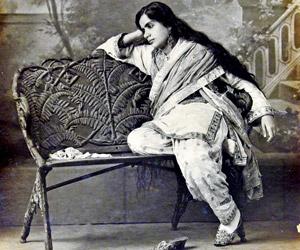
They made unlikely buddies. Imagine the man who would be king of Hindi masala movies, phoning two Parsi schoolteachers for after-dinner ice-cream at Chowpatty. Octogenarian sisters Mani and Roshan Panthaky recall this clearly from younger years spent in Khetwadi — they at Tara Mansion, Manmohan Desai at Pratap Niwas.
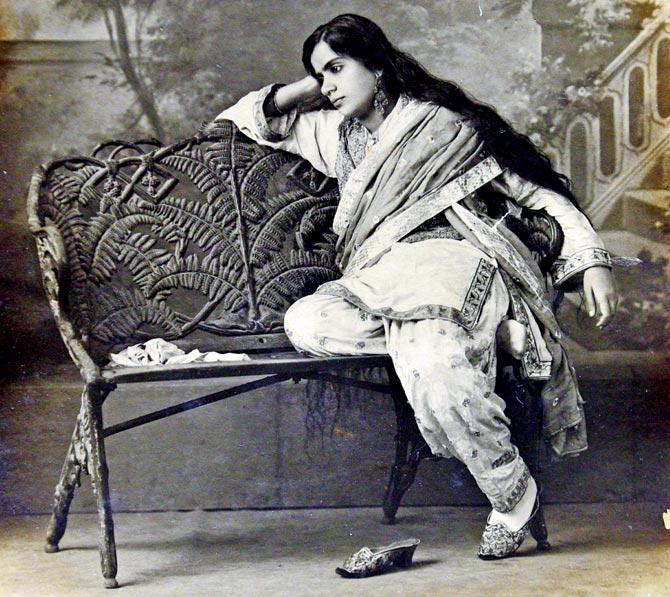
Singing star Munni Bai's family lives on in Tara Mansion after her
ADVERTISEMENT
"Manmohan was a wonderful person," says Mani, a JB Petit School legend for 50 years, in their quiet Dadar Parsi Colony flat. "We left because Khetwadi's congestion got terrible," explains Roshan who taught at Walsingham School. "Initially, the silence was deafening. We were used to people wandering about Khetwadi at 2-3 in the morning." The arterial Grant Road, laid in 1839, eased access to Khetwadi and Girgaum. An open drain on its east flank was filled in to raise Khetwadi Back Road. From this stretch I branch into the precinct's messy maze of 14 lanes. Sidestepping crimson pools of paan, dodging rods and tubes stacked in the wholesale metal market booming here.
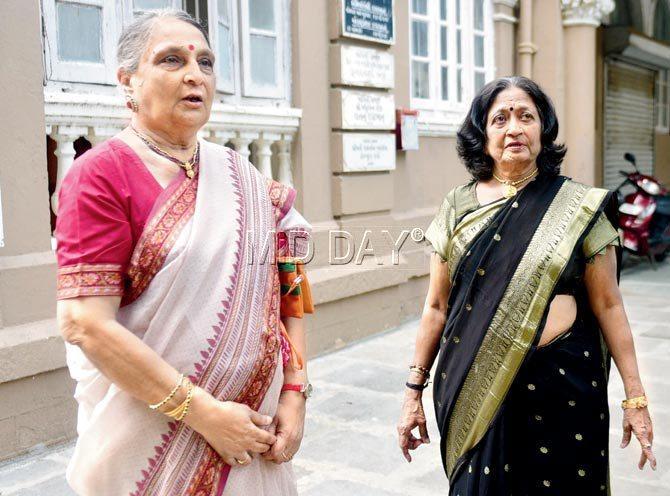
Aruna Munim and Jaya Anand of Bhagini Samaj in front of the 102-year-old welfare society's headquarters. Pics/Bipin Kokate
Steering me through, social worker Jaya Anand happily rediscovers childhood haunts like Shri Ganesh Cycle Shop. We chat with Pravin Yadav, embroidered saree specialist of Swaminarayan Stores. Opposite Cama Baug since 1944, Pravin and his father Purshottamdas saw Peepul and Ashoka trees on the road disappear. Further down, Bhikhubhai Master, the third-generation force behind Ambalal Ladies Tailor frowns, asking, "Who wears classic cut cholis anymore?" At Mukesh Travel Agency, in 90-year-old RK Building, Suman Thakkar misses "the homeliness" of residents gossiping on fretted verandahs, called otlas, till the 1990s influx of Marwari, Jain and other traders. "Gujaratis still tour the most," he observes.
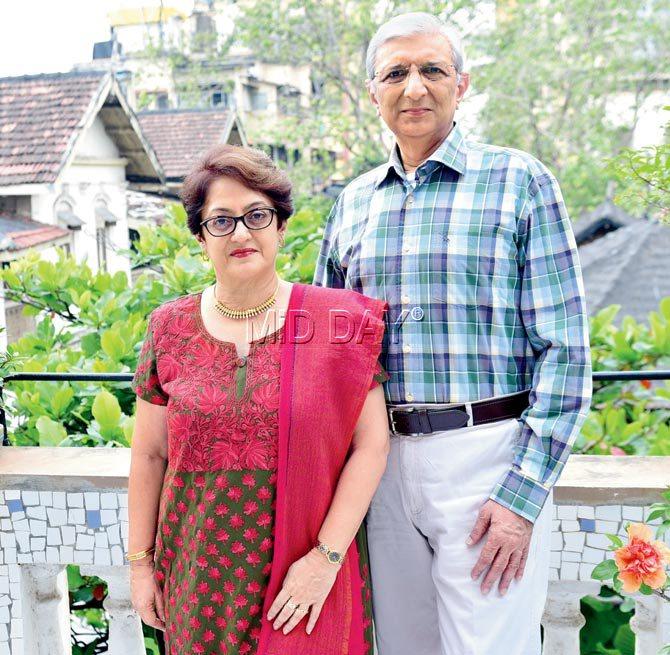
Rashmi and Kumar Desai on the terrace of their apartment in Bhagini Samaj building, third in line of the strikingly designed 'Arab Buildings' on Khetwadi Main Road
The place named for paddy fields and groves (khet-wadi) presents a treeless spectre today. Khetwadi's architecture has seen a savagery of avatars. Hairstylist Jehanbux Mogul's Kerawalla House-turned-Laxmi Niwas, is now 13-storey Disha Residency. "Towers are the monstrous trend, cutting our trees," he says. A massive mango tree shading a cluster of cottages is chopped to accommodate a building christened Earth View. Yet, Mogul insists, "I'll refuse posh Pedder Road to end my days in Khetwadi."
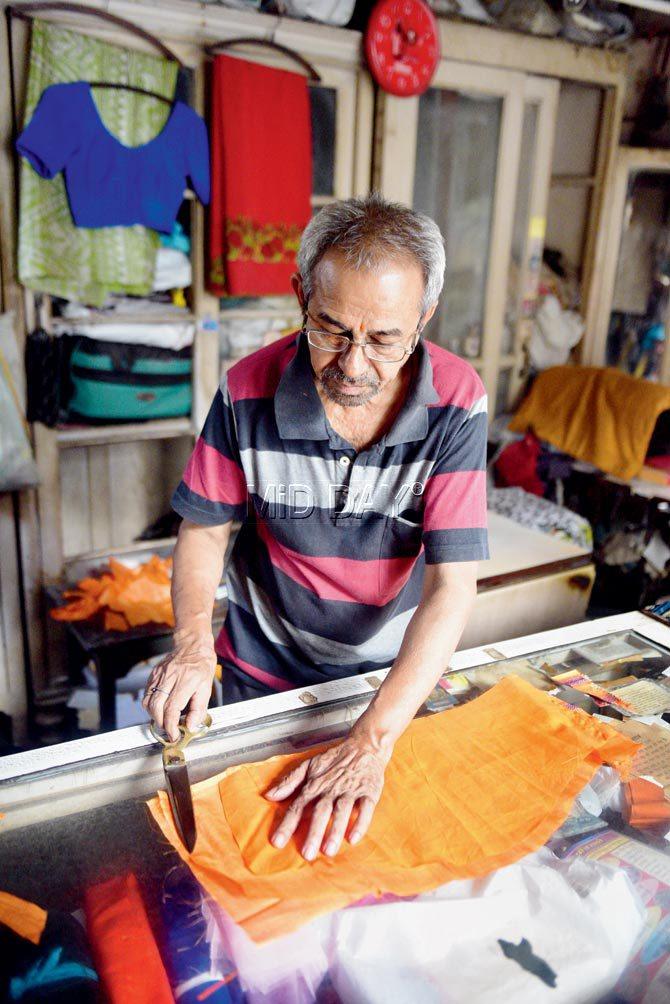
Bhikhubhai Master continues cutting classic cholis at Ambalal Ladies Dress Maker opened a century ago by his grandfather
Manmohan Desai couldn't have agreed more. The director-producer would sit in a chair on the road cheering his team at gully cricket, saying, "Mine is the ground. I can't make movies from the 36th floor." Nobody disturbed him while he was batting, not even Amitabh Bachchan. Bollywood's first vanity van was given to the megastar by Manji, as Desai was known. Manmohan didn't mind nosy neighbours enquiring, "What has Jeevan Bhabhi cooked for lunch?" Ketan Desai reveals his parents carried on "a saamnewali khidki romance", Manmohan captivated by Jeevanprabha a not-so-secret glance away in Dr Bhajekar Lane. Helming silent films for his Paramount banner, Manmohan's father Kikubhai died in debt. The family moved to Khetwadi from Seven Bungalows. Another filmdom denizen in those bungalows was Geeta Bali, whose daughter by Shammi Kapoor is Ketan's wife Kanchan. Khetwadi appealed to Manmohan: windows within touching distance, greetings waved early morning, feuding families united in emergencies.
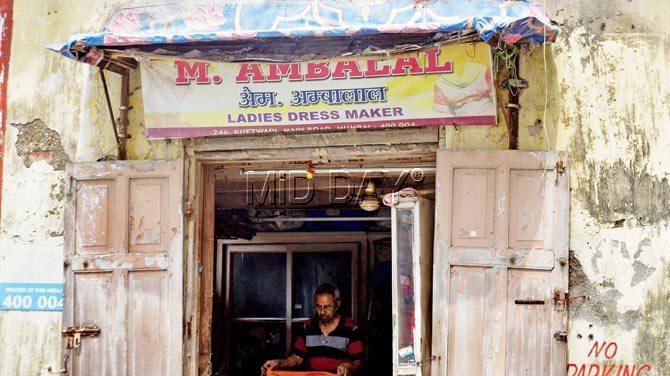
"It's thought that my heroes are unbelievable, but so are people," the lord of the lost-and-found formula famously said of Amar Akbar Anthony's characters. The last lad may have been a local bootlegger who'd shout, "Kya man, Desai, tum toh apun ka bhai hain" — lingo that fit Anthony Gonsalves tight as the white gloves he wore leaping out of the giant Easter egg in that hit song. Transplanted to tonier Nepeansea Road, Manmohan pined for his home mile and rode back to Bhajekar Lane in a lorry. "Khetwadi's fabric is crushed," says Ketan. "Terraces we flew kites from are poky penthouses." He is proud their home passed to activist Pandurang Shastri Athavale, whose Swadhyay movement impacted millions globally.
Ketan's uncle Kumar Desai, third in an ancestral line of four lawyers, describes the spell of movie magic. Celluloid entertainers notching up golden jubilees swept screens of Krishna Talkies, Daulat, Naaz, Shalimar, Majestic, Imperial, Novelty and Super. Within catcall feet from anywhere in Khetwadi, these halls welcomed outstation relatives as audiences. At 9 pm, they strolled out in merry bunches, searching for available options. "Someone invariably knew a distributor or manager, saying, 'Jya ticket maleh tya besee javaanu — sit wherever you get seats'," says Kumar.
The downscaled area used to be genteel. Kumar's wife Rashmi takes me around their airy Bhagini Samaj apartment on Khetwadi Main Road. It is in one of three striking "Arab Buildings" erected by Mustafa Bin Abdul Latif, whose agent Kantilal Variawalla was also a jeweller. "A floor below, men winnowed tiny Dubai pearls like grain," Kumar recalls. Rooms bear clues to cloistered zenana quarters. Invisible women peered at the street from slats in windows lowered to ground level. Rowed second, Vanita Vishram School is clad in antique gallery grills from 1915, when Gandhiji spoke in the bordering garden it maintained. Kaifi Azmi's family stayed in the first Arab Building and Shabana attended Queen Mary's School with Kumar's sisters. Before that became HN Reliance Foundation's extension of Hurkisondas Hospital, solicitor Rajan Jayakar visited his grand-aunt Laxmibai there. Her husband, Waman Keshavji Mankar, was Presidency Magistrate and Coroner of Bombay. Their son Deepak writes in the memoir, Pop Goes the Slop: "The 233 Khetwadi Main Road Mankars lived well. We had a maroon-and-black Wolseley Wasp... must have been among Khetwadi's few to own a pressure cooker, wireless set and refrigerator at the beginning of the 1950s. Those days Pathare Prabhus occupied key administrative positions."
Thanks to my mother-in-law volunteering at Petit Charitable Dispensary nearby (her father, exhibitor Peshotan Kuka, proprietor of Novelty and Dreamland cinemas, was a patron of Sardar High School in Lane 12), I meet the good ladies of Bhagini Samaj, decked in Diwali finery. The 102-year-old society functioned from Lamington Road till current president Vishakha Ghia's great-grandmother-in-law, Chanchalben, donated space in the third Arab Building in 1948. Their welfare services focus firmly on education and healthcare for women and children. Secretary Aruna Munim walks me to their dental, ophthalmic, psychiatry, homeopathy and physiotherapy clinics, sewing section and well-stocked library.
Bhagini Samaj Club on the top floor has a wooden badminton court, along with facilities for table tennis, carrom and chess. Kumar Desai recollects middle-aged matrons tuck up their sarees ahead of aggressive badminton rounds. Originally for women, the club then allowed children and men presently form the majority of members. A lady instructor-led women's gym and garba class are very popular. Across Bhagini Samaj stands handsome in stone Tara Mansion constructed by Dr Sattha, of Masina Hospital, in 1925. I choose photos arrayed on the lid of a 200-year-old piano by Dolly Desai, of her celebrated grandmother Munni Bai whose family occupied the second floor from 1942. Married to Dolly's grandfather Darabsha Dhunjisha, Munni Bai shone in productions like Raja Harishchandra, to be declared Sangeet Rani. She had joined Dhunjisha's uncle Khurshedji Baliwala's Victoria Theatrical Company when she was seven. The singing sensation continued a performance straight after a snake slithered up her lustrous long hair as she was drying it for the stage appearance. Landlord Pankaj Kacheria shares how his father Ochhavlal renamed this building for his wife Tara. The 11th Lane side entrance has the original "Dina Mansion" — after Sattha's wife Dina — etched in stained glass.
Scottish missionary John Wilson put up at Ambroli Mission House in Parsiwada, Lane 2. He went on to establish Ambroli Church and Victorian Gothic-styled Wilson College later in 1836. A little inward, his wife Margaret introduced western India's first boarding school for girls, St Columbia. Dotted with temples, Khetwadi is Ganpati heartland. Each lane boasts an idol. Throngs gather in the 12th lane which sweeps pandal contest prizes. Murtis at 1922-built Tulsi Building have been crafted of buttons, garam masala and tutti frutti. Paths blocked for the feast, it's a 10-day pedestrian plaza, cars marooned till the deity's immersion.
Elephant god to feline pet... I smile thinking of Kumar point to his rear balcony which sheltered a tiger cub his grandfather rescued (a delightful sepia print shows it bent over a feeding bowl there). Last to hold the combined post of Court Receiver and Liquidator, Balwantrao Desai accompanied Indian and British officers on the occasional weekend hunt. His family lavished attention on an orphaned tiger he brought home. Reaching Alsatian size, the cub was sent to Mysore Zoo. Alarming telegrams soon flooded the Desais: the animal simply refused to eat. Raised vegetarian, it shunned meat. Diet tweaked, it thrived. After all, it was a Khetwadi baby.
Author-publisher Meher Marfatia writes fortnightly on everything that makes her love Mumbai and adore Bombay. You can reach her at mehermarfatia@gmail.com
 Subscribe today by clicking the link and stay updated with the latest news!" Click here!
Subscribe today by clicking the link and stay updated with the latest news!" Click here!







